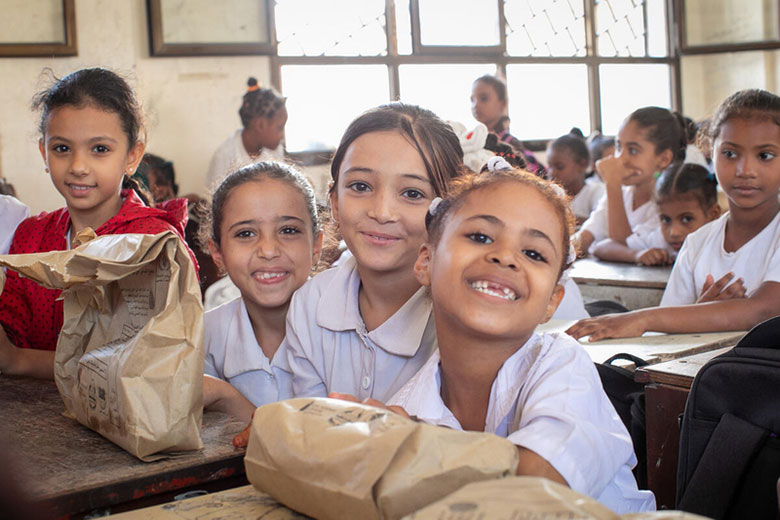The UAE is the latest member state to join the Schools Meals Coalition (SMC), coming off the back of a ministerial meeting in Helsinki. The unfolding food crisis and the resulting rise in food insecurity are leading to the new urgency to expand the coalition in all countries and to ensure that every child has the opportunity to grow, learn and thrive.
Launched in 2021 at the UN Food Systems Summit, the coalition is comprised of more than 70 countries and 75 partners, including United Nations agencies, civil society, the private sector, and academia – all working together to drive actions to urgently re-establish, improve and scale up school meals and guarantee that by 2030, every child worldwide receives a healthy meal in school.
In early 2020, school feeding programmes around the world delivered more meals than ever before, reaching 388 million children. However, with the onset of the Covid-19 pandemic, the programmes halted as almost all countries closed their schools, leaving 370 million school children without access to school meals, which for many of them constituted the one meal a day they relied on for nutrition. The loss highlighted the important role that schools play not only in providing education but also in providing important health and nutrition services for children.
HE Mariam bint Mohammed Almheiri, UAE Minister of Climate Change and Environment, said: “The UAE is committed to providing sufficient, healthy, nutritious and safe food for its young generation and helping other countries do the same. Since 2007, we have invested nearly $80 million in the School Health and Nutrition portfolio, reaching 7.4 million beneficiaries in 25 countries, through our leading philanthropic organisation Dubai Cares. Building on its expertise, Dubai Cares played an instrumental role in creating the SMC.”
In early 2020, school feeding programmes around the world delivered more meals than ever before, reaching 388 million children
Commenting on the UAE’s strategic decision to join the Coalition, HE Dr Tariq Al Gurg, Chief Executive Officer and Vice-Chairman of Dubai Cares, said: “As a founding member of the School Meals Coalition, Dubai Cares’ mission is to galvanise the sector and advocate for school feeding programs to bring about necessary changes in countries that most need support, as well as attract new donors to join this global movement that improves children’s cognitive development. The inclusion of the UAE in the SMC sends a strong signal to Arab donors and neighbouring countries from our region to start looking into the urgency of food security in schools.”
Especially in light of the unfolding food crisis, the World Food Programme (WFP), the secretariat of the SMC, warns that the global food crisis has pushed an additional 23 million under-18 youth into acute food insecurity, taking the total of children now affected to 153 million. This represents nearly half of the 345 million people currently facing acute food insecurity. The long-term effects of hunger and malnutrition are detrimental to children, who are the future of our world, and the SMC aims to tackle and reverse this trend to ensure all children can thrive.
The UAE intends to support the SMC by assisting in the creation of sustainable food supply chains and sharing its experience in reducing food loss and waste through the National Food Loss and Waste Initiative (Ne’ma), promoting the sales of local produce and leveraging technology to tackle pressing challenges. It also seeks to encourage other countries of the GCC region to join the Coalition and highlight its work during relevant high-level engagements.
The unfolding food crisis and the resulting rise in food insecurity is leading to the new urgency to expand the coalition in all countries
Reinvigorated, the SMC has three fundamental objectives: to restore existing national school meals and school-based health service delivery by 2022; to reach the 73 million most vulnerable children who did not have access to meals even before the pandemic by 2030; and to improve the overall quality and efficiency of programs by 2030.
It is estimated that around $5.8bn annually would be required to provide these 73 million vulnerable children with school meals and complementary health interventions.
While school meal programmes combat child hunger, poverty, and multiple forms of malnutrition to contribute to a prosperous development, it also has a much broader impact on society and the economy. According to a Harvard analysis, every $1 invested in school meals yields up to $9 in economic returns.
There are four key areas where the SMC supports local economies, creates jobs and livelihoods in communities, and ultimately helps break the links between hunger, unsustainable food systems and the learning crisis. These areas are social protection, whereby families can rely on school meals to save money and increase their household income; education, where there is a noticeable increase by an average of 9% in enrolment when schools have beneficial programmes in place; agriculture, by purchasing locally grown food for school meals, boosting job creation and local food systems; and finally nutrition, by providing a regular source of nutrients that are essential for school children’s mental and physical development. These programmes also promote gender equity, helping to attract and keep girls in school.








